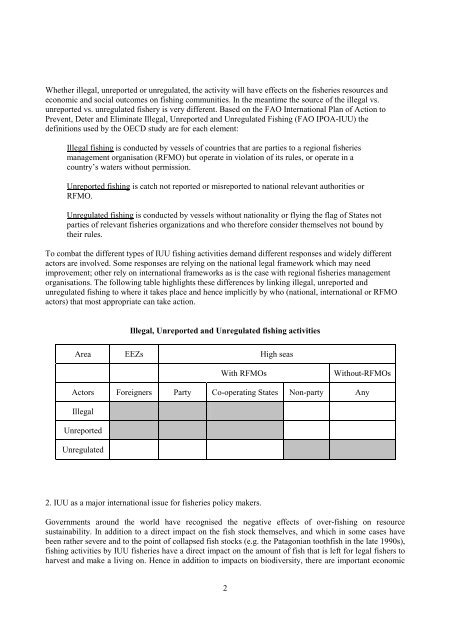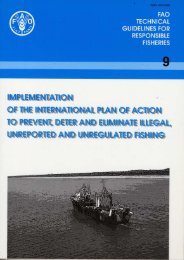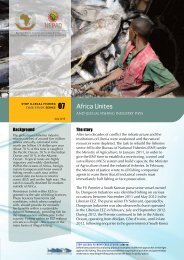1 Addressing Illegal, Unreported and Unregulated (IUU ... - OECD
1 Addressing Illegal, Unreported and Unregulated (IUU ... - OECD
1 Addressing Illegal, Unreported and Unregulated (IUU ... - OECD
Create successful ePaper yourself
Turn your PDF publications into a flip-book with our unique Google optimized e-Paper software.
Whether illegal, unreported or unregulated, the activity will have effects on the fisheries resources <strong>and</strong>economic <strong>and</strong> social outcomes on fishing communities. In the meantime the source of the illegal vs.unreported vs. unregulated fishery is very different. Based on the FAO International Plan of Action toPrevent, Deter <strong>and</strong> Eliminate <strong>Illegal</strong>, <strong>Unreported</strong> <strong>and</strong> <strong>Unregulated</strong> Fishing (FAO IPOA-<strong>IUU</strong>) thedefinitions used by the <strong>OECD</strong> study are for each element:<strong>Illegal</strong> fishing is conducted by vessels of countries that are parties to a regional fisheriesmanagement organisation (RFMO) but operate in violation of its rules, or operate in acountry’s waters without permission.<strong>Unreported</strong> fishing is catch not reported or misreported to national relevant authorities orRFMO.<strong>Unregulated</strong> fishing is conducted by vessels without nationality or flying the flag of States notparties of relevant fisheries organizations <strong>and</strong> who therefore consider themselves not bound bytheir rules.To combat the different types of <strong>IUU</strong> fishing activities dem<strong>and</strong> different responses <strong>and</strong> widely differentactors are involved. Some responses are relying on the national legal framework which may needimprovement; other rely on international frameworks as is the case with regional fisheries managementorganisations. The following table highlights these differences by linking illegal, unreported <strong>and</strong>unregulated fishing to where it takes place <strong>and</strong> hence implicitly by who (national, international or RFMOactors) that most appropriate can take action.<strong>Illegal</strong>, <strong>Unreported</strong> <strong>and</strong> <strong>Unregulated</strong> fishing activitiesArea EEZs High seasWith RFMOsWithout-RFMOsActors Foreigners Party Co-operating States Non-party Any<strong>Illegal</strong><strong>Unreported</strong><strong>Unregulated</strong>2. <strong>IUU</strong> as a major international issue for fisheries policy makers.Governments around the world have recognised the negative effects of over-fishing on resourcesustainability. In addition to a direct impact on the fish stock themselves, <strong>and</strong> which in some cases havebeen rather severe <strong>and</strong> to the point of collapsed fish stocks (e.g. the Patagonian toothfish in the late 1990s),fishing activities by <strong>IUU</strong> fisheries have a direct impact on the amount of fish that is left for legal fishers toharvest <strong>and</strong> make a living on. Hence in addition to impacts on biodiversity, there are important economic2
















